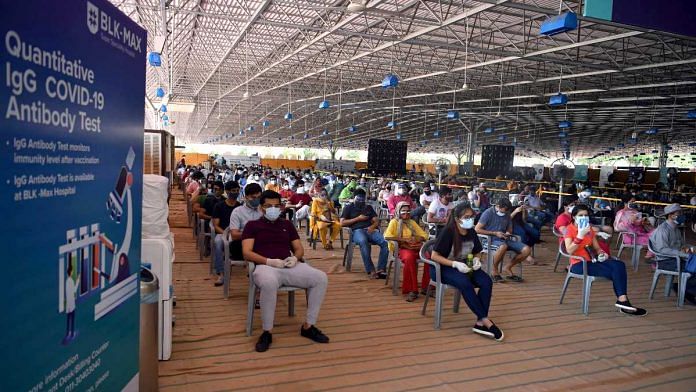The second wave of the Covid-19 pandemic has laid bare India’s deeply demoralising contradiction: a country with one of the world’s most sophisticated data infrastructures has lost count of health workers, infection rates, and even the dead bodies. It is easy — and justified — to blame this debacle on the pandemic and Prime Minister Narendra Modi. But the roots of the problem go deeper. Successive governments have sidelined scientists, taken control of data, and politicised the processes of data-gathering and analysis.
After the first wave of the Covid-19 pandemic, scientific experts who were well-aware of the “dangers of false optimism” were shunted to the margins. In January 2021, the Modi government’s own national scientific task force on Covid-19 stopped meeting. In March, the government downplayed the reports of dangerous mutant strains by the Indian SARS-CoV-2 Genomics Consortium (INSACOG).
In addition to ignoring scientists, the government has also restricted access to scientific data. On 29 April 2021, hundreds of Indian scientists signed an open letter to PM Modi, blaming the extraordinary infection rates on “epidemiological data not being systematically collected and released.” They also complained that data gathered by the Indian Council of Medical Research (ICMR) from Covid-19 diagnostic centres is only available to government experts for analysis. The Principal Scientific Adviser to the Government of India has acknowledged the letter, but no data has yet been released.
Also read: Funerals jump 166% but less than half listed as Covid deaths shows Delhi’s real toll is higher
A routine affair
None of this is surprising considering the current government’s long-standing anti-science posture. International collaboration has become heavily restricted. Earlier this year, the Ministry of External Affairs (MEA) tried to limit even virtual interactions between academics (though the new rules requiring permission for online discussions were scrapped after uproar). The basic conventions of scientific engagement are being reconsidered. At the Indian Science Congress of 2019. the usual Nobel laureates were replaced by administrator-theologians who advocated for the use of ancient scripture as scientific evidence and even proposed renaming gravitational waves to “Narendra Modi waves”!
The overtly nationalist government’s actions on controlling data are strangely incongruous with India’s rich history of evidence-based policy. After Independence, even before the political boundaries of modern India were clear, scientists like P.C. Mahalanobis and P.V. Sukhatme worked alongside the government to establish one of the most sophisticated data infrastructures in the world. The National Sample Surveys (NSS) were the world’s first large-scale surveys to use the method of random sampling. Health scientists and social scientists have worked together with these and many other surveys to curb diseases like polio, leprosy, and HIV.
Though the weaknesses of India’s data architecture have become glaringly obvious in the pandemic, the roots of the problem lie deep in the past. For more than three decades, successive governments have exploited India’s data systems for narrow political interests. In the early 2000s, a small change in the design of the large scale NSS, for example, led to a politically convenient but entirely artificial decrease in reported Indian poverty levels, triggering what Nobel laureate Angus Deaton called “The Great Indian Poverty Debate.” In the mid-2000s, the statistical revision of Indian poverty lines was so politicised that it ultimately ended up in the Supreme Court.
Also read: Indian health data will miss recording many Covid and lockdown deaths
India, disadvantaged
Reliable information on human development trends is also now hard to find. Population surveys, rich in data on mortality, malnutrition, immunisation and health, are too often partial in coverage and irregularly administered. Questionnaires and protocols keep changing. It is difficult to reconcile them to calculate trends. These surveys do not gather data on the incidence of non-communicable diseases or causes of death.
As a result, even before the Covid-19 pandemic struck, the drivers of premature mortality in the Indian population were poorly understood. Vital statistics data cannot close this gap since only 80 per cent of deaths in India are registered, and only 22 per cent assigned an official cause. The Million Lives Survey, which studied cause-specific risk-factors and mortality rates in India, documented that suicide, road accidents and snakebites claimed far more lives than was previously estimated. Even this survey, however, had limitations and does not provide much insight into the population-level vulnerabilities for contracting Covid-19.
The current crisis is now largely being managed by ideological politicians and bureaucrats whose instincts are to avoid data and rely on “legal frameworks, institutional mechanisms and administrative provisions.” The scientists, however, are diligently at work in the margins. During the pandemic, they have been at the forefront of the development of new vaccines, low-cost ventilators, new methods of testing and even quantitative models to track infections.
These experts are worth many times the amount of foreign aid entering India (or the Indian health budget, which stands at just 1 per cent of GDP). It is time to bring the scientists back into the fold of policy and revive the great Indian tradition of collaboration, data analysis, and evidence-based policy.
Shareen Joshi is an Associate Professor of International Development at Georgetown University’s School of Foreign Service in the United States. She has a PhD in economics from Yale University. She is originally from Jaipur, India. Her research focuses on issues of inequality, human capital investment and grassroots collective action in South Asia. Views are personal.
(Edited by Prashant Dixit)



